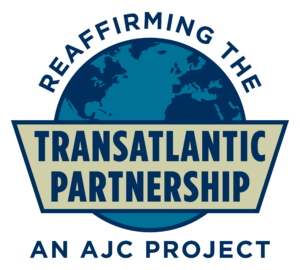 At a “defining moment” of strain in the transatlantic alliance, dozens of world leaders, including former Vice President Joe Biden, former Speaker of the House of Representatives John Boehner, former Secretary of State Madeleine Albright and former Prime Minister of the United Kingdom Tony Blair, are pledging support for a “vital partnership of democracies that has served as the bedrock of peace and prosperity from the Cold War to the present.”
At a “defining moment” of strain in the transatlantic alliance, dozens of world leaders, including former Vice President Joe Biden, former Speaker of the House of Representatives John Boehner, former Secretary of State Madeleine Albright and former Prime Minister of the United Kingdom Tony Blair, are pledging support for a “vital partnership of democracies that has served as the bedrock of peace and prosperity from the Cold War to the present.”
 “We, the undersigned, are grateful inheritors of the postwar regime of transatlantic security bestowed on us by visionary American and European leaders who were inspired by common values and united against common threats,” they write in a full-page ad in The New York Times.
“We, the undersigned, are grateful inheritors of the postwar regime of transatlantic security bestowed on us by visionary American and European leaders who were inspired by common values and united against common threats,” they write in a full-page ad in The New York Times.
“We rise in defense of the precious alliance of democracies—and its treaties, institutions and norms—that has sustained peace and generated prosperity from the Cold War to the present day,” they add, endorsing an initiative of the American Jewish Committee.
“Americans and Europeans are joined at the hip by common foundational values and common existential threats, and thus by a common agenda,” said AJC CEO David Harris. “The ties that link this precious fraternity of kindred nations must never be permitted to fray, for they represent the best hope for the ultimate realization of a genuinely peaceful and prosperous world.” RTWT
On the plus-side, Russia’s interference in Ukraine is pushing it closer to Europe, says a leading analyst.
 It is ironic that the Russian invasion, originally intended to punish Ukraine’s Western-oriented government, has pushed the country in a dramatically different direction, writes Washington Post columnist Anne Applebaum, a Pulitzer Prize-winning historian and a professor of practice at the London School of Economics:
It is ironic that the Russian invasion, originally intended to punish Ukraine’s Western-oriented government, has pushed the country in a dramatically different direction, writes Washington Post columnist Anne Applebaum, a Pulitzer Prize-winning historian and a professor of practice at the London School of Economics:
It’s also a reminder that the supposed strategic gifts of Vladimir Putin, the Russian president, are in fact very limited. His interference in Ukraine has made a once-friendly neighboring country into an enemy. His efforts to unite “Russian-speaking peoples” into a Eurasian bloc persuaded thousands of people to stop speaking Russian. And, of course, his interference in the U.S. election has produced more paranoia about Russia in the United States, and more opposition to Russia, than we’ve seen in half a century.
Ukraine is an excellent reminder of how violence can have unexpected consequences — and of how a short-term victory can lead to a longer-term defeat, adds Applebaum, a board member of the National Endowment for Democracy.







